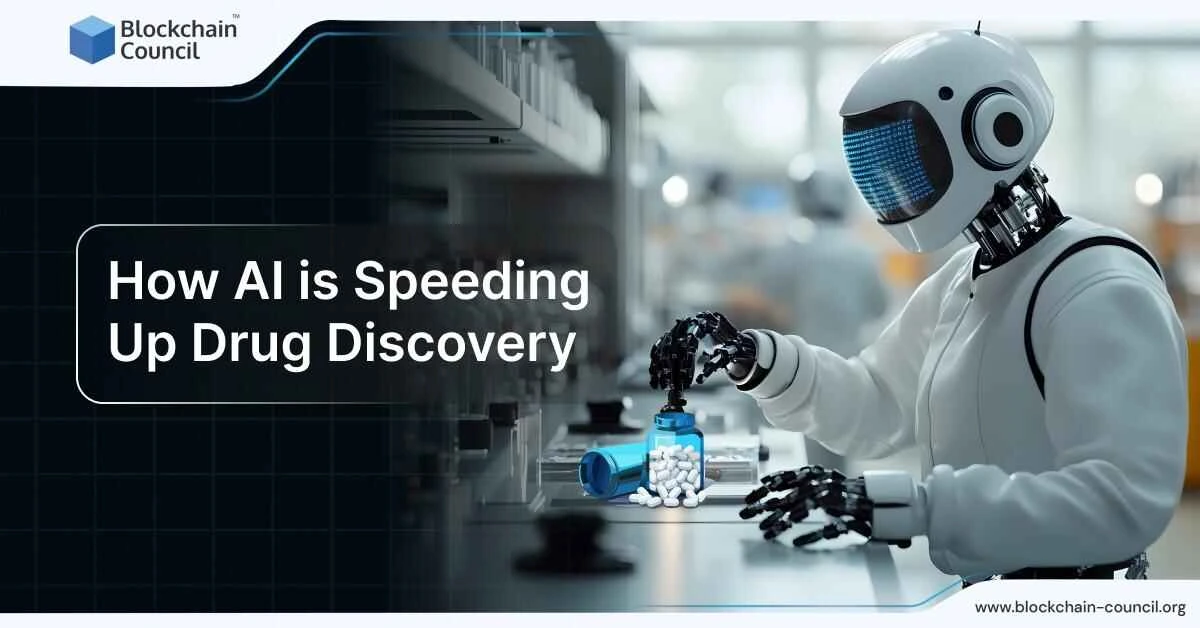
- Blockchain Council
- October 10, 2024
The process of discovering new drugs has always been long, expensive, and quite complicated. Traditionally, it could take over ten years and billions of dollars to create just one drug. But today, artificial intelligence (AI) is helping make this process quicker.
Now, AI helps pharmaceutical companies spot potential drug candidates faster than ever. With the help of AI, timelines are shortening, and expenses are going down. This means companies can bring life-saving drugs to patients sooner.
AI in Early Stages of Drug Discovery
At the beginning of drug development, AI plays an important role in finding possible drug candidates. Before, this was often a slow process involving trial and error. However, AI systems are now able to quickly scan large sets of chemical structures, biological data, and scientific research. This speeds up the process of identifying drug targets with better accuracy.
Companies such as Insilico Medicine and Exscientia are leading this change. Insilico’s platform has found promising drug candidates for diseases like idiopathic pulmonary fibrosis, advancing one compound to Phase 2 clinical trials. This success highlights AI’s potential in tackling diseases with few treatment options. Exscientia also uses AI to create small molecules for clinical trials, resulting in several AI-designed drugs. For instance, their drug DSP-1181, developed for treating obsessive-compulsive disorder, was designed in record time.
AI’s role in pharmaceuticals is growing rapidly, and so is the demand for developers who can bring efficient AI solutions to life. A Certified Artificial Intelligence (AI) Developer™ credential could be the key to staying competitive in this field.
AI in Chemical Synthesis and Drug Design
Creating molecules that interact with biological targets, known as chemical synthesis, is another area where AI excels. AI-driven models can simulate many chemical reactions, predicting their results. This speeds up the creation of potential drug molecules. Companies like Aqemia and Absci are using AI platforms to identify drug candidates for diseases such as cancer and neurological disorders. Absci, for example, has teamed up with AstraZeneca to develop AI-designed antibodies, showing how adaptable AI is in creating both small molecules and biologics.
AI tools like DeepChem and DeepTox are revolutionizing molecular structure optimization, making the discovery process much more accurate. These platforms quickly sift through large chemical libraries, helping identify molecules that might treat diseases like cancer or neurological disorders.
Speeding Up Clinical Trials with AI
Clinical trials are often the most time-consuming and costly part of drug development. But AI is helping reduce these challenges by improving trial design, patient recruitment, and data analysis. Janssen Pharmaceuticals, for example, has used AI to predict disease incidence rates. This has led to faster trials, with fewer participants needed. AI also simplifies recruitment by scanning large datasets to find suitable trial candidates, reducing the errors that can occur when manually selecting participants.
Additionally, wearable technology, when paired with AI, boosts the efficiency of clinical trials. These devices collect real-time data on patients’ health, making it easier to spot any unusual reactions to treatments. This method not only saves time but also improves the accuracy of trial results.
Precision Medicine and AI
AI’s ability to process large amounts of genetic data is a driving force behind precision medicine. By analyzing a patient’s unique genetic information, AI helps design treatments tailored to individual needs. This is especially helpful in cancer treatment, where AI can pinpoint specific mutations in cancer cells. This allows the design of drugs that target these mutations without harming healthy cells.
Pharmaceutical companies are also using AI to work on previously “untreatable” diseases by developing drugs aimed at specific genetic targets. In cancer, for example, AI has been crucial in uncovering how cancer cells resist treatments, which helps doctors adjust how drugs are given to improve results.
AI-Driven Drug Development: Success Stories
There have been some exciting breakthroughs in AI-driven drug development recently. Insilico Medicine has created a small-molecule inhibitor targeting an enzyme linked to solid tumors, which is now in clinical trials. Another notable example is BenevolentAI, which repurposed the drug baricitinib for COVID-19 treatment in just days during the pandemic, demonstrating AI’s ability to quickly find new uses for existing drugs.
Collaboration is another key trend. Big pharmaceutical companies are increasingly teaming up with AI-focused biotech firms. Merck, Sanofi, and Bristol Myers Squibb have signed multimillion-dollar partnerships with companies like Exscientia and BioMap to apply AI in developing small-molecule drugs and biologics.
Conclusion
Artificial intelligence is transforming the pharmaceutical world by making drug discovery and development faster and more efficient. From finding drug candidates to streamlining clinical trials, AI has reduced both the time and cost involved in creating new treatments. As more companies use AI technologies, the future holds promise for the development of treatments for diseases once thought untreatable. With AI continuing to advance, its influence in medicine will likely expand, leading to quicker medical advancements that benefit both patients and healthcare systems.



































































 Guides
Guides News
News Blockchain
Blockchain Cryptocurrency
& Digital Assets
Cryptocurrency
& Digital Assets Web3
Web3 Metaverse & NFTs
Metaverse & NFTs
